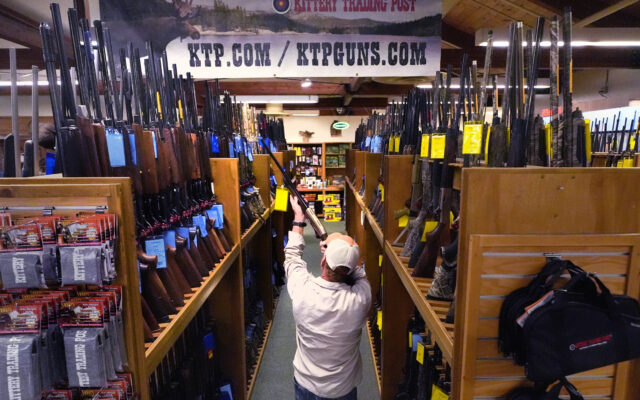
Maine’s 72-hour waiting period for gun purchases violates 2nd Amendment, lawsuit says
By Marie Weidmayer and Billy Kobin, Bangor Daily News Staff
Gun rights groups filed a lawsuit Tuesday that seeks to overturn the 72-hour waiting period law that Maine lawmakers passed after last year’s mass shooting in Lewiston.
The Sportsman’s Alliance of Maine and Gun Owners of Maine had expressed their intent to sue after Gov. Janet Mills, a Democrat who previously opposed sweeping gun-control measures, let the waiting period bill become law in April without her signature. The law took effect in early August and says gun dealers must wait 72 hours after making an “agreement” with a customer to turn the firearm over to them.
The waiting period violates people’s Second Amendment rights, according to the lawsuit filed in U.S. District Court of Maine in Bangor. The lawsuit against Attorney General Aaron Frey is filed by five Mainers: Andrea Beckwith, owner of East Coast School of Safety; Rep. Jim White, R-Guilford, who owns J White Gunsmithing; Adam Hendsbee, owner of A&G Shooting; Thomas Cole, owner of TLC Gunsmithing; and Nancy Coshow of Bridgton, who had to wait to buy a gun.
They asked for a preliminary injunction, where a federal judge would pause the law until the lawsuit is settled. No future court dates are scheduled.
A challenge to Maine’s waiting period law has been expected since it took effect this summer. The proposal from Sen. Peggy Rotundo, D-Lewiston, was one of several gun control and mental health measures from Democratic lawmakers after the Oct. 25, 2023, rampage at a Lewiston bowling alley and bar that killed 18 and injured 13 more in Maine’s deadliest mass shooting. The gunman, a 40-year-old Army reservist from Bowdoin, legally purchased his semi-automatic rifle several months before the shooting and before he received psychiatric treatment in New York.
Spokespeople for Frey and Mills did not immediately respond Wednesday to requests for comment, but the state does not typically comment on pending litigation.
Rotundo and supporters said the waiting period law will help reduce suicides in Maine, where 158 of 178 firearm deaths in 2021 were suicides. Studies have found waiting periods of between two and seven days can lower risks of suicide and domestic violence shootings, while little empirical evidence exists to support a claim they delay victims in getting self-protection.
“The gun lobby can certainly challenge the law,” Rotundo said Wednesday. “My priority, along with the majority of my constituents, is on saving lives.”
The lawsuit claims the statute prevents people from taking a gun home when they buy it and delays people’s rights “for the sake of delay, on the theory that even law-abiding citizens who have passed a background check cannot be trusted with a firearm.”
Maine’s waiting period is not consistent with how the United States has historically regulated guns, which means it violates the Second Amendment, the lawsuit says.
“There is no longstanding tradition in this country of forcing law-abiding citizens to wait to acquire firearms,” the lawsuit said.
The 72-hour period is concurrent with the time it takes to run a federally mandated background check. Maine joined 12 other states in requiring some kind of waiting period, according to Everytown for Gun Safety. Exempt are sales to family members and police officers along with sales of antique firearms and “temporary” transfers for guided hunts, among other activities.
Violators face a maximum fine of $500 for a first offense and $1,000 for a repeat offense. In April, Mills asked Frey and Public Safety Commissioner Michael Sauschuck to monitor legal challenges to waiting periods in other states, such as Vermont.
In July, a federal judge rejected an attempt by gun rights groups to halt Vermont’s waiting period law and its ban on high-capacity magazines. The challengers cited the U.S. Supreme Court’s Bruen decision in 2022 against a New York law tied to concealed carry permit applications.
Gun sales have had a “dramatic drop-off” since Maine’s waiting period went into effect, per the lawsuit. White’s overall sales at J White Gunsmithing have decreased by 50 percent and rifle sales have decreased by 25 percent compared with previous August and September sales.
White owns one of the last gun shops as hunters reach rural northern Maine. About four times per hunting season, he sells to people who either forgot their rifle, realized something was wrong with it or damaged it, the lawsuit said.
The other plaintiffs also argued their gun sales have dropped and that the law prevents customers from more quickly buying firearms to protect themselves. For example, Beckworth is a firearms instructor and teaches non-lethal self-defense. Her clients are typically women experiencing domestic violence and Beckworth would show them a variety of handguns so the women could choose what works best to protect themselves, the lawsuit said.
Once the woman passed a background check, she would buy the gun she needed to keep herself, and sometimes their children, safe. However, the waiting period now means they cannot immediately have a gun to protect themselves, according to the lawsuit.
While the transfer agreements do not need to be put in writing, the state advised gun shops to keep documentation of them in case sales are called into question. Sportsman’s Alliance of Maine leader David Trahan had argued the guidance and law are a “mess” because the state is asking dealers to retain records they are not required to keep.
Mills also signed into law this spring a background check expansion, “yellow flag” tweaks and investments in mental health services while vetoing a bump stock ban.